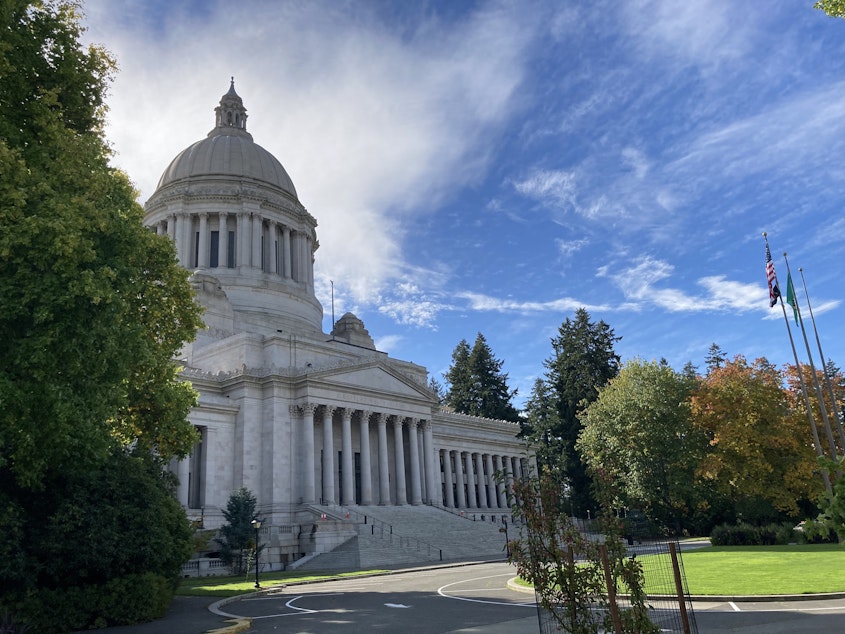'Hey, don’t tax our beer!' With a budget shortfall looming, WA beer lobby goes on the offensive

Coronavirus cases are spiking. A major election is looming. And Washington’s legislative session is still two months away. But Washington’s beer lobby has a message for top elected officials that apparently can't wait.
In a letter sent to Gov. Jay Inslee and legislative leaders last week, representatives of the beer, grocery and hospitality industry urged policymakers “not to increase taxes on beer.”
“While we recognize the state is facing substantial budget challenges, we believe the harm caused by a beer tax increase would far outweigh the benefit for the state,” the letter said.
Washington faces a $4.2 billion budget shortfall through 2023 due to the economic fallout from the coronavirus pandemic.
For now, there’s no indication a beer tax is on tap in Olympia.
Sponsored
But the industry isn’t taking any chances. Especially after what happened in 2010. That’s when lawmakers imposed an increase in the beer tax as part of a plan to balance a budget hammered by the Great Recession. This year’s preemptive lobbying effort has a one-bitten-twice-shy feel to it and comes as majority Democrats are freely talking about potential tax hikes next year.
The letter to Inslee and the lawmakers was signed by Rick Hicks, president of Teamsters 28, Tammie Hetrick of the Washington Food Industry Association, Annie McGrath of the Washington Brewers Guild, Scott Hazlegrove of the Washington Beer and Wine Distributors Association and Julia Gorton of the Washington Hospitality Association.
In the letter, the groups offered three arguments for why the beer tax shouldn’t be increased.
They called it “one of the most regressive taxes” in Washington. They said an increase in the tax would result in declining beer sales and likely lead to job losses in brewing, distribution and hospitality -- industries already hard hit by the pandemic. They also noted Washington has one of the highest beer taxes in the western United States. Washington’s beer tax ranks 25th nationally, according to the Tax Foundation. By contrast Oregon ranks 45th.
Washington charges a per-barrel beer tax. For smaller breweries that rate is $4.782 per barrel. For larger breweries that produce more than 60,000 barrels a year, the tax is $8.08 per barrel.
Sponsored
Beer is also subject to retail sales tax at the point of purchase. In fiscal year 2019, the beer tax brought in $31 million.
In 2010, the per-barrel excise tax for large volume brewers was nearly tripled resulting in a more than doubling of the beer tax revenue collected by the state year-over-year. Smaller brewers were exempted from the increase.
In 2013, those increases were set to expire. But that year Inslee, who had just taken office, proposed to make the tax increase permanent to help pay for education.
At a news conference to unveil his budget and tax plan, Inslee famously described the beverage as the “beautiful amber nectar of the gods.”
But his proposal triggered an intense round of lobbying in opposition to the taxes. In the end, the Legislature allowed the taxes to expire.
Sponsored
Since then beer taxes have not been a topic of discussion in Olympia. But this year the state is once again in the throes of a recession.
Inslee, who’s seeking a third term, is expected to present a balanced budget proposal in December. It wouldn’t be surprising if his plan includes some revenue proposals, but Inslee’s communications director, Tara Lee, said, “There has been no talk about raising the beer tax; we’ve not had any conversations about it.”
Two Democratic state senators who have been privy to tax discussions said the same thing.
“It hasn’t even surfaced,” said Sen. Reuven Carlyle of Seattle. “I was part of the package 10 years ago and it hasn’t been talked about since.”
Carlyle added that he “let out a chuckle” when he saw the letter from the beer lobby.
Sponsored
“Never underestimate the power of lobbyists to make up a crisis,” Carlyle said.
Similarly, Sen. Joe Nguyen, who has been vocal about his opposition to an austerity budget, waived off the idea that a beer tax increase is in the works.
“When we talk about progressive revenue, the beer tax wasn’t really part of that conversation,” Nguyen said.
But industry representatives said they’ve been hearing everything is on the table as Democrats begin to look at options to balance the budget next year. They also noted the beer tax hike showed up quickly in 2010. This year the industry clearly wants to get ahead of the issue -- especially given the impact the recession is already having on beer sales and the hospitality industry more broadly.
When the pandemic hit in March, beer tax collections immediately plummeted 80 percent, according to figures from the Liquor and Cannabis Board. They mostly recovered the following month, but since then have been down monthly. Bars and restaurants account for about 20 percent of beer sales, while grocery and convenience stores account for 80 percent.
Sponsored
“This is the most difficult time the craft brewing industry has ever seen,” said Allen Rhoades of the Rockfish grill and Anacortes Brewer in a statement.
Rhoades said since the pandemic started his wholesale beer sales are down 60%, and retail sales are down 48%. He added that a tax increase could put some craft brewers out of business.
"Hitting us with a tax increase when our revenues are a fraction of what they were last year will economically harm us at a time when we are already struggling,” Rhoades said.
Sen. Nguyen acknowledged the toll the pandemic has had on the food and beverage industry, but chastised the signatories to the letter for focusing on a hypothetical tax increase instead of the broader issue of getting the hospitality industry back on its feet..
“There’s a bigger problem at play here than just beer,” Nguyen said.
Copyright 2020 Northwest News Network

